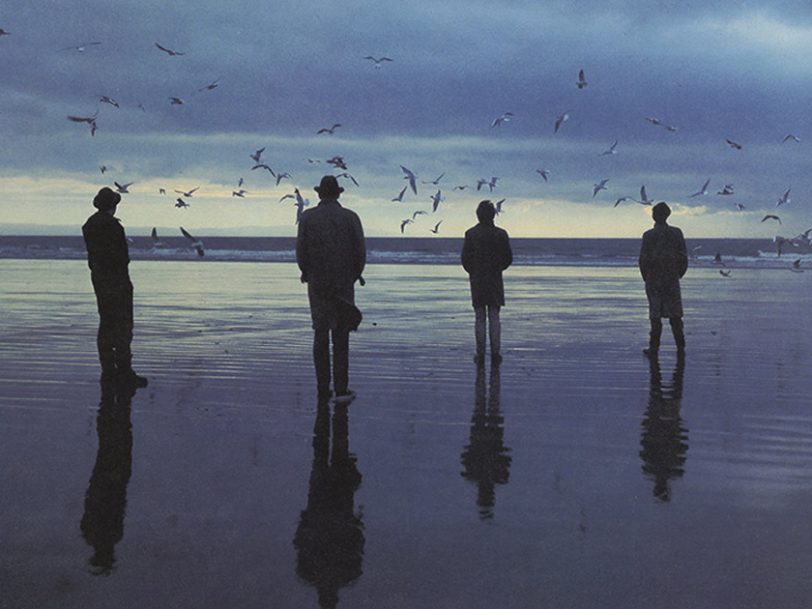Formed in 1978 amid the dying breaths of punk’s first wave, Liverpudlian group Echo And The Bunnymen harnessed punk’s raised-middle-finger attitude to their own knack for a skewed melody and sonic innovation, taking no prisoners as they eventually assailed the mainstream. Across six years and their first four albums, the group developed a sound that went from stripped-down post-punk to experimental new wave and neo-psychedelia, with their pathological aversion towards toeing the line forcing the world to come to them.
“We were wrapped up in our own little world, very protective of everything,” Bunnymen guitarist Will Sergeant tells Dig! Once accused by former manager Bill Drummond (later to form pop-art antagonists The KLF with Jimmy Cauty) of feeling as though “changing chord was selling out”, Sergeant adds, “I almost didn’t want anyone to know about us.” After the group released their first single, The Pictures On My Wall, in 1979, he says, “I wanted to know everybody that bought it – like wanting to vet them. Make sure they were cool enough.”
Listen to the best of Echo And The Bunnymen here.
“It was always done as an artistic thing… We thought everything else was rubbish”
“It was never done to make money or sell any records,” the guitarist asserts of Echo And The Bunnymen’s creative impetus. “It was always done as an artistic thing… We thought everything else was rubbish, except for a few bands. That was just our attitude, but it helped us get through.”
Originally formed as a three-piece – Sergeant, Ian McCulloch on guitar and vocals, and Les Pattinson on bass – Echo And The Bunnymen took inspiration from the boundary-pushers that had gone before them. “I really liked The Doors. I loved the dynamic way their songs would go from being really loud to really quiet, changing the mood,” Sergeant says. The guitarist also found a kinship with other bands that were pushing the punk template forward – Buzzcocks and Joy Division in the neighbouring city of Manchester; Mekons and Gang Of Four in Leeds; The Comsat Angels and the early incarnation of The Human League in Sheffield; Talking Heads, Pere Ubu and Suicide in the US. “At one point my nickname was ‘Manchester’, because I like all the Manchester bands,” Sergeant says. “We all loved The Fall, and we all started dressing in crappy clothes, like The Fall did… I was quite an expert at dressing like a shit member of The Fall.”
That, however, is where any conscious attempts to emulate other groups ended. “I listened to people, but I didn’t try to play their stuff,” Sergeant says. “I’m not really interested in doing that… because I don’t want to be coloured by what they did or the way they write. I want to just be me. So I never really learned to play Stairway To Heaven or anything like that. I can just about manage Deep Purple’s Smoke On The Water…”
Rather, Echo And The Bunnymen fashioned their own sound: spacious, often doomy, and set further apart with their use of a drum machine as opposed to a real-life sticksman – though the electronic kit that underpinned the group’s early live performances would, inadvertently, become a personality in itself when the band’s name inspired a long-running myth.
“It was a throwaway thing to shut some journalist up”
“It was just a crazy name that one of Mac’s mates thought up,” Sergeant reveals. “I didn’t know anything about it until we did our first gig. We were just announced as Echo And The Bunnymen. I thought, What the fuck’s that? That’s horrible.
“Band names are weird, but you grow into them and they start to take on their own life,” Sergeant continues. “People started thinking Mac was Echo. We didn’t like it, and he didn’t like it, either. We didn’t want to be Mac’s Bunnymen, and he didn’t want to be Echo. One time, someone said, ‘Who’s Echo?’ And Mac went, ‘It’s the drum machine.’ It was a throwaway thing just to shut some journalist up. So we propagated that rumour.”
As well as adding a little mystique, the drum machine also helped the fledgling group tighten their playing. “When we started, we couldn’t play very well – I couldn’t, anyway,” Sergeant admits. “Les had only just learned to play bass, but straight away he was really good at being tight… At one point there was a tape going round of all my mistakes – ‘Will’s Mistakes On Gigs’ – because I wasn’t that proficient. I had the ideas, but I didn’t know how to execute them in exactly the same way every time.” The drum machine, however, “gave us a real steady, solid base to play rhythmically”.




